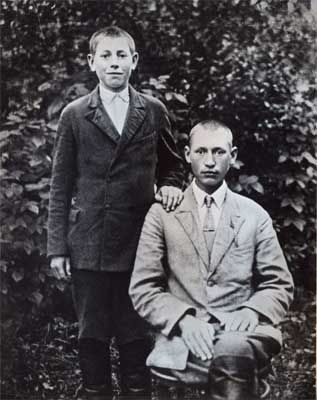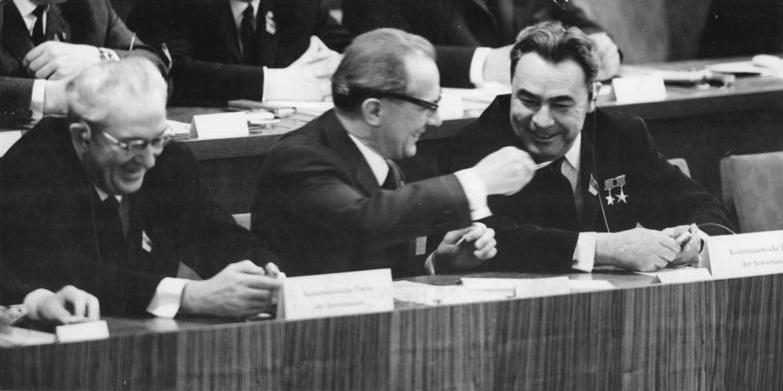|
Masherov
Pyotr Mironovich Masherov, ''Piotr Mironavič Mašeraŭ''russian: Пётр Миронович Машеров (né Mashero; – 4 October 1980) was a Soviet partisan, statesman, and one of the leaders of the Belarusian resistance during World War II who governed the Byelorussian Soviet Socialist Republic as First Secretary of the Communist Party of Byelorussia from 1965 until his death in 1980. Under Masherov's rule, Belarus was transformed from an agrarian, undeveloped nation which had not yet recovered from the Second World War into an industrial powerhouse; Minsk, the capital and largest city of Belarus, became one of the fastest-growing cities on the planet. Masherov ruled until his sudden death in 1980, after his vehicle was hit by a potato truck. Born to a peasant family in what is today the Vitebsk Region during the early stages of the Russian Civil War, Masherov was a teacher in mathematics and physics in his youth. Following his father's arrest and death during the ... [...More Info...] [...Related Items...] OR: [Wikipedia] [Google] [Baidu] |
Belarusian Resistance During World War II
The Belarusian resistance during World War II opposed Nazi Germany from 1941 until 1944. Belarus was one of the Soviet republics occupied during Operation Barbarossa. The term Belarusian partisans may refer to Soviet-formed irregular military groups fighting Germany, but has also been used to refer to the disparate independent groups who also fought as guerrillas at the time, including Jewish groups (such as the Bielski partisans and Fareynikte Partizaner Organisatsye), Polish groups (such as the Home Army), and nationalist Belarusian forces opposed to Germany. Pro-Soviet resistance After the victories of the Wehrmacht against the Red Army in 1941, Belarus was one of the Soviet republics that came under control of Nazi Germany (Operation Barbarossa). The official government of the occupation forces was established on August 23, 1941, under the direction of Wilhelm Kube, the German administrator of the ''Generalbezirk Weißruthenien''. The German pacification operations ... [...More Info...] [...Related Items...] OR: [Wikipedia] [Google] [Baidu] |
Communist Party Of Byelorussia
The Communist Party of Byelorussia (CPB; russian: Коммунистическая партия Белоруссии; be, Камуністычная партыя Беларусі) was the ruling communist party of the Byelorussian Soviet Socialist Republic, a constituent republic of the Soviet Union from 1922, that existed from 1917 to 1993. The party was founded in 1917 as the Communist Party (Bolsheviks) of Byelorussia (russian: Коммунистическая партия (большевиков) Белоруссии) following the Russian Revolution of 1917 as part of the Russian Communist Party (bolsheviks) led by Vladimir Lenin on December 30–31, 1918 with 17,800 members. It was important in creating the Byelorussian Soviet Republic in January 1919. From February 1919 until 1920 it functioned as a single organisation together with the Communist Party of Lithuania, known as the Communist Party (bolsheviks) of Lithuania and Belorussia. It was renamed to the ''Communist Pa ... [...More Info...] [...Related Items...] OR: [Wikipedia] [Google] [Baidu] |
Tikhon Kiselyov
Tikhon Yakovlevich Kiselyov (russian: Ти́хон Я́ковлевич Киселёв, be, Ціхан Якаўлевіч Кісялёў; 12 August (Old Style, O.S.: 30 July), 191711 January 1983) was a Belarusian statesman in the Soviet Union, the leader (first secretary) of the Communist Party of Byelorussia, i.e., the de facto leader of the Byelorussian SSR (1980–1983). at hrono.info Career Party *1940: member of the CPSU *1961: member of the CPSU Central Committee *1980: first secretary of Central Committee the Communist Party of Byelorussia *1980: CPSU Central Committee Politbureau candidateGovernment *1954: member of the Supreme Soviet of the USSR *1959-1978: Chairman of the BSSR Council of Ministers *1978-1980: Deputy Chairman of the USSR Council of Ministers ...[...More Info...] [...Related Items...] OR: [Wikipedia] [Google] [Baidu] |
23rd Politburo Of The Communist Party Of The Soviet Union
The Politburo of the 23rd Congress of the Communist Party of the Soviet Union was in session from 1966 to 1971. The 23rd Congress, the first such event since Nikita Khrushchev's ousting, the Presidium reverted to its previous name; Politburo. Mikoyan and Nikolai Shvernik, the two oldest members, were not reelected to the Presidium, while Arvīds Pelše became the only Presidium débutant. While Brezhnev may have been General Secretary, he did not have a majority in the Presidium; when Kosygin and Podgorny agreed on policy, which was not often the case, Brezhnev found himself in the minority. Brezhnev could only count on three to four votes in the Presidium: Suslov, who often switched sides, Kirilenko, Pelše and Dmitry Polyansky. Brezhnev and Kosygin often disagreed on policy; Brezhnev was a conservative while Kosygin was a modest reformer. Kosygin, who had begun his premiership as Brezhnev's equal, lost much power and influence within the Presidium when he introduced the 1965� ... [...More Info...] [...Related Items...] OR: [Wikipedia] [Google] [Baidu] |
24th Politburo Of The Communist Party Of The Soviet Union ...
The Politburo of the 24th Congress of the Communist Party of the Soviet Union was in session from 1971 to 1976. Composition Members Candidates References {{Communist Party of the Soviet Union Politburo of the Central Committee of the Communist Party of the Soviet Union members Politburo Politburo Politburo Politburo Politburo Politburo Politburo Politburo Politburo A politburo () or political bureau is the executive committee for communist parties. It is present in most former and existing communist states. Names The term "politburo" in English comes from the Russian ''Politbyuro'' (), itself a contraction ... [...More Info...] [...Related Items...] OR: [Wikipedia] [Google] [Baidu] |
25th Politburo Of The Communist Party Of The Soviet Union ...
The Politburo of the 25th Congress of the Communist Party of the Soviet Union was in session from 1976 to 1981. Composition Members Candidates References {{Communist Party of the Soviet Union Politburo of the Central Committee of the Communist Party of the Soviet Union members Politburo Politburo Politburo Politburo Politburo Politburo Politburo Politburo Politburo A politburo () or political bureau is the executive committee for communist parties. It is present in most former and existing communist states. Names The term "politburo" in English comes from the Russian ''Politbyuro'' (), itself a contraction ... [...More Info...] [...Related Items...] OR: [Wikipedia] [Google] [Baidu] |
Kirill Mazurov
Kirill Trofimovich Mazurov ( be, Кіры́ла Трафі́мавіч Ма́зураў, russian: Кири́лл Трофи́мович Ма́зуров; 25 March 1914, Rudnia-Pribytkovskaya, Mogilev Governorate – 19 December 1989) was a Soviet partisan, politician, and one of the leaders of the Belarusian resistance during World War II who governed the Byelorussian Soviet Socialist Republic as First Secretary of the Communist Party of Byelorussia from 1956 until 1965, when he became a member of the Politburo of the CPSU. Political career Kirill Mazurov was born in 1914 in the Mogilev Governorate of the Russian Empire in a peasant family of Belarusian ethnicity. He was originally a construction technician, and graduated from the Gomel highway technical school in 1933. He joined the Communist Party of the Soviet Union in 1940 and the Red Army in 1941. During the Great Patriotic War, he participated in military actions as a political instructor, a battalion commander and an instru ... [...More Info...] [...Related Items...] OR: [Wikipedia] [Google] [Baidu] |
Yuri Andropov
Yuri Vladimirovich Andropov (– 9 February 1984) was the sixth paramount leader of the Soviet Union and the fourth General Secretary of the Communist Party of the Soviet Union. After Leonid Brezhnev's 18-year rule, Andropov served in the post from November 1982 until his death in February 1984. Earlier in his career, Andropov served as the Soviet ambassador to Hungary from 1954 to 1957, during which time he was involved in the suppression of the 1956 Hungarian Uprising. He was named chairman of the KGB on 10 May 1967. In this position, he oversaw a massive crackdown on dissent carried out via mass arrests and involuntary psychiatric commitment of people deemed "socially undesirable". After Brezhnev suffered a stroke in 1975 that impaired his ability to govern, Andropov effectively dominated policy-making alongside Foreign Minister Andrei Gromyko, Defense Minister Andrei Grechko and Grechko's successor, Marshal Dmitry Ustinov, for the rest of Brezhnev's rule. Upon Brezhnev ... [...More Info...] [...Related Items...] OR: [Wikipedia] [Google] [Baidu] |
Operation Barbarossa
Operation Barbarossa (german: link=no, Unternehmen Barbarossa; ) was the invasion of the Soviet Union by Nazi Germany and many of its Axis allies, starting on Sunday, 22 June 1941, during the Second World War. The operation, code-named after Frederick Barbarossa ("red beard"), a 12th-century Holy Roman emperor and German king, put into action Nazi Germany's ideological goal of conquering the western Soviet Union to repopulate it with Germans. The German aimed to use some of the conquered people as forced labour for the Axis war effort while acquiring the oil reserves of the Caucasus as well as the agricultural resources of various Soviet territories. Their ultimate goal was to create more (living space) for Germany, and the eventual extermination of the indigenous Slavic peoples by mass deportation to Siberia, Germanisation, enslavement, and genocide. In the two years leading up to the invasion, Nazi Germany and the Soviet Union signed political and economic pacts for st ... [...More Info...] [...Related Items...] OR: [Wikipedia] [Google] [Baidu] |
Russian Civil War
, date = October Revolution, 7 November 1917 – Yakut revolt, 16 June 1923{{Efn, The main phase ended on 25 October 1922. Revolt against the Bolsheviks continued Basmachi movement, in Central Asia and Tungus Republic, the Far East through the 1920s and 1930s.{{cite book, last=Mawdsley, first=Evan, title=The Russian Civil War, location=New York, publisher=Pegasus Books, year=2007, isbn=9781681770093, url=https://archive.org/details/russiancivilwar00evan, url-access=registration{{rp, 3,230(5 years, 7 months and 9 days) {{Collapsible list , bullets = yes , title = Peace treaties , Treaty of Brest-LitovskSigned 3 March 1918({{Age in years, months, weeks and days, month1=11, day1=7, year1=1917, month2=3, day2=3, year2=1918) , Treaty of Tartu (Russian–Estonian)Signed 2 February 1920({{Age in years, months, weeks and days, month1=11, day1=7, year1=1917, month2=2, day2=2, year2=1920) , Soviet–Lithuanian Peace TreatySigned 12 July 1920({{Age in years, months, weeks and da ... [...More Info...] [...Related Items...] OR: [Wikipedia] [Google] [Baidu] |
Great Purge
The Great Purge or the Great Terror (russian: Большой террор), also known as the Year of '37 (russian: 37-й год, translit=Tridtsat sedmoi god, label=none) and the Yezhovshchina ('period of Nikolay Yezhov, Yezhov'), was General Secretary of the Communist Party of the Soviet Union, Soviet General Secretary Joseph Stalin's campaign to solidify his power over the party and the state; the Purge, purges were also designed to remove the remaining influence of Leon Trotsky as well as other prominent political rivals within the party. It occurred from August 1936 to March 1938. Following the Death and state funeral of Vladimir Lenin, death of Vladimir Lenin in 1924 a power vacuum opened in the Communist Party of the Soviet Union, Communist Party. Various established figures in Lenin's government attempted to succeed him. Joseph Stalin, the party's General Secretary, outmaneuvered political opponents and ultimately gained control of the Communist Party by 1928. Initially ... [...More Info...] [...Related Items...] OR: [Wikipedia] [Google] [Baidu] |
Leonid Brezhnev
Leonid Ilyich Brezhnev; uk, links= no, Леонід Ілліч Брежнєв, . (19 December 1906– 10 November 1982) was a Soviet Union, Soviet politician who served as General Secretary of the Communist Party of the Soviet Union, General Secretary of the Communist Party of the Soviet Union between 1964 and 1982 and Chairman of the Presidium of the Supreme Soviet between 1960 and 1964 and again between 1977 and 1982. His 18-year term as General Secretary was second only to Joseph Stalin's in duration. Brezhnev's tenure as General Secretary remains debated by historians; while his rule was characterised by political stability and significant foreign policy successes, it was also marked by corruption, inefficiency, Era of Stagnation, economic stagnation, and rapidly growing technological gaps with the West. Brezhnev was born to a working-class family in Kamianske, Kamenskoye (now Kamianske, Ukraine) within the Yekaterinoslav Governorate of the Russian Empire. After the re ... [...More Info...] [...Related Items...] OR: [Wikipedia] [Google] [Baidu] |




.jpg)


